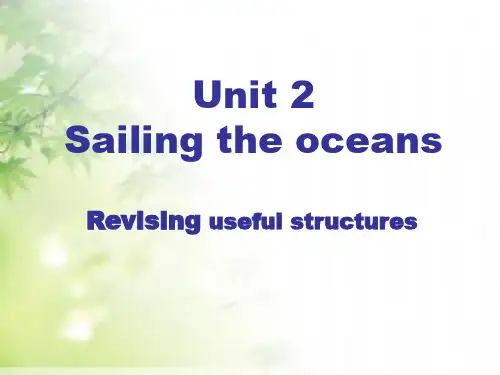人教英语选修9Unit2Inversion
- 格式:pptx
- 大小:872.75 KB
- 文档页数:23
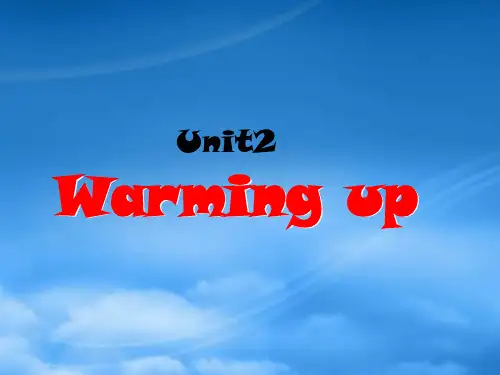
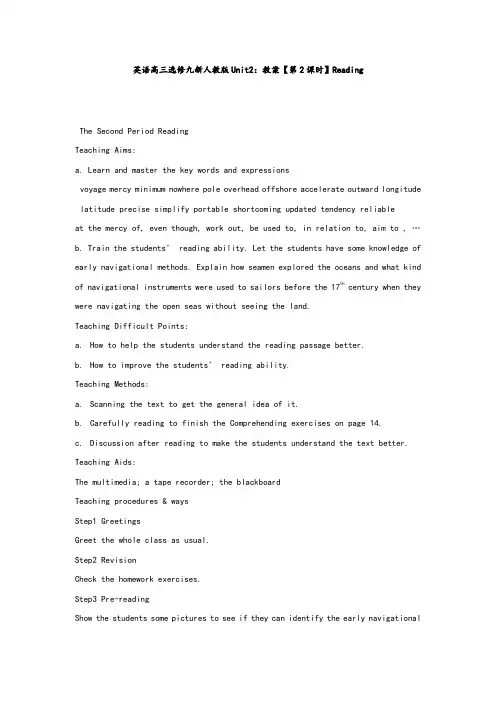
英语高三选修九新人教版Unit2:教案【第2课时】ReadingThe Second Period ReadingTeaching Aims:a. Learn and master the key words and expressionsvoyage mercy minimum nowhere pole overhead offshore accelerate outward longitude latitude precise simplify portable shortcoming updated tendency reliableat the mercy of, even though, work out, be used to, in relation to, aim to , …b. Train the students’ reading ability. Let the students have some knowledge of early navigational methods. Explain how seamen explored the oceans and what kind of navigational instruments were used to sailors before the 17th century when they were navigating the open seas without seeing the land.Teaching Difficult Points:a.How to help the students understand the reading passage better.b.How to improve the students’ reading ability.Teaching Methods:a.Scanning the text to get the general idea of it.b.Carefully reading to finish the Comprehending exercises on page 14.c.Discussion after reading to make the students understand the text better. Teaching Aids:The multimedia; a tape recorder; the blackboardTeaching procedures & waysStep1 GreetingsGreet the whole class as usual.Step2 RevisionCheck the homework exercises.Step3 Pre-readingShow the students some pictures to see if they can identify the early navigationalinstruments seamen used and explain how they used.Step 4 DiscussionDiscuss the questions on page11.Step 5 Listening and comprehendingAfter listening to the contents of the text do the comprehending exercises on page 14&15.Step 6 ExplanationAfter comprehending, it is a good time to deal with the new words and language points in this part, esp. the following:voyage mercy minimum nowhere pole overhead offshore accelerate outward longitude latitude precise simplify portable shortcoming updated tendency reliableat the mercy of, even though, work out, be used to, in relation to, aim to , Step7 DiscussionLet’s the students have a discussion by working in pairs or in groups.Topic: Imagine you are on a boat with twenty-nine other people. You have a small box for your personal things but it can only hole ten items. What would you need for a week’s journey across the North Sea to England?Suggested Answer:Step8 SummaryThis reading explains how seamen explored the oceans and what kind of navigational instruments were used to sailors before the seventeenth century when they were navigating the open seas without seeing the land.Step9 HomeworkFinish the exercises about using words and expression on page61.************************************全单元教学目标概论I. 单元教学目标Ⅱ.目标语言。
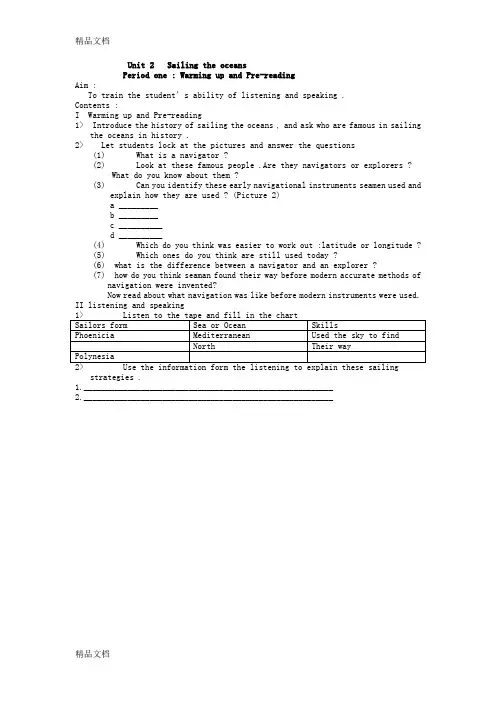
Unit 2 Sailing the oceansPeriod one : Warming up and Pre-readingAim :To train the student’s ability of listening and speaking .Contents :I Warming up and Pre-reading1> Introduce the history of sailing the oceans , and ask who are famous in sailingthe oceans in history .2> Let students lock at the pictures and answer the questions(1) What is a navigator ?(2) Look at these famous people .Are they navigators or explorers ?What do you know about them ?(3) Can you identify these early navigational instruments seamen used andexplain how they are used ? (Picture 2)a _________b _________c __________d __________(4) Which do you think was easier to work out :latitude or longitude ?(5) Which ones do you think are still used today ?(6) what is the difference between a navigator and an explorer ?(7) how do you think seaman found their way before modern accurate methods ofnavigation were invented?Now read about what navigation was like before modern instruments were used. II listening and speakingstrategies .1._________________________________________________________2._________________________________________________________Period two: readingAim :Let students master some language points and understand the text .Contents : Reading : sailing the oceans1> Answer some questions about the text1. How many ways the passage tells us to keep alongside thecoastline .2. When can the sailors use the sun to navigate by ?3. What was the first instrument to measure the sun’s position .4. What proved to be the most accurate and reliable of these earth navigational instruments ?5. When did seamen begin to use the compass ?2> Language points :1. voyage : n. long journey , by sea or in space2. mercy : n. kindness ; forgivenessphr : at the mercy of : under the control of 任由… …的摆布without mercy 毫不留情地The beat was at the mercy of the rapid river .For mercy ‘s sake 请发慈悲For Cod’s sake3. nowhere adv .not anywhere 无处eg : I went nowhere 不知来自哪里,以不知名状态go nowhere vi 无所成,进行得不顺利get sb nowhere 某某事对某人无帮助、元效4. reference n. act of mentioning ; act of looking at forinformation .phr : (1) have reference to 和… …有关系(2) in reference to 关于(3) make (a) reference to 说到谈到(4) reference book 参考书刊号(5) reference material 参考资料(6) with reference to 关于就… …而论 whit reference to the contextvi refer: refer to (a) 指的是(b)参考 (c) 提到谈到refer to A as B 将A称为Beg : Are you referring to me ?In his s peech, he didn’t refer to the problem at all .He cooked dinner by referring to a cookbook .California is referred to as the “G olden State .”5. survival: n. state of continuing to live 生存、幸存survive: vt.sb survive 某人幸存下sth survive 某物保留下来vi. survive sb by 活得比某人长… …survive sth 从… … 中幸存、幸存于…eg : Only one baby survived the terrible car crash .The girl survived her parents .Survivor n. the person or thing of surviving .6. dusk n. time before nightat dusk 在黄昏时刻Period three : comprehending and languageI ComprehendingRead the passage and answer the following questions .1 . What is the use of a bearing circle . astrolabe , quadrant or sextant ?( )What is the use of a compass ? ( )A to set the course of the shipB to measure the position of the shipC to measure the speed of the shipD to tell the time2. Why are speed and time important in working out the longitude of a ship ?3. Why is the position of the sun and various stars useful for working outlatitude ?4. Suppose you were a sea captain aiming to sail round Africa Discuss in groups.(1) what skills would you seek in your sailors ?(2) what problems would you anticipate for this journey ?II Learning about languageDo exercises 1 . 2 and 3Exerise1 Replace the words underlined by ones of similar meaning form the reading passage .1. Seeing the dark clouds above him , George hurried for home .2. Sailing a boat alone far away form the shore made Flora’s parentsworry about her safety .3. Clare , would you please put your bicycle next to the others in theshed ?4. “Why don’t you plot a more simple rout with the smallest numberof sp ots?” asked Mary .5. Setting out on a long journey by sea with unskilled sailors would bedangerous especially if there were no modern navigational instruments . Exercise2 Find the words form the reading passage that are the opposite of these compound words .Nowhere anywhere download upload outward inwardReliable unreliable seaweed land flower shortcoming strong point Exercise3:Complete the following paragraph with the words below .precise outward nowhere awkward reference seaweedaccelerate mercy randomly voyage alongside approximateSamuel the sailor was extremely good at plotting his course using the stars a ________.One day he was determined to set out on a ________across an unknown sea to an unknown continent . He set out with his instruments so he would not be at the _________ Of the sea . He found on his _______journey a rocky island . It seemed to be covered in nests. Suddenly, as Samuel looked , an enormous bird swooped down and picked him up as if he were a/an ______ parcel . It ______its speed and rose straight up into the air so as to reach the _______place on the rocks where its nest lay. Once there, it shook itself and threw Samuel in the ________ direction of the nest . There seemed to be ______to hide but then he noticed lots of ______ on his left and quickly hid under it . The bird landed nearby and pecked ______ at the rocks . Samuel rolled over swiftly and found himself at the edge of the cliff . He looked down slowly with a beating heart. Below him was his boat lying ______the shore! “How lucky I am!”Samuel thought to himself. He then gave a mighty leap and landed in it. Once inside he could safely sail away.Period four : Reading speaking and writingAim :to train th e student’s ability of listening and speaking and writing Contents : some language points1〉starvation : n. suffering or death from lack of food die of starvation starve : vt/vi (使某人)饿死、挨饿starve sb to deathphr: starve for sth to do sthbe starved of vt 缺乏……欠缺……2> gradually : adj not suddenlygradual : adj happening slowlyeg : a gradual increase in populationHer health is gradually improving3> tear : vt/vi 撕裂扯破tear sthsth from /off /out of……adv (away off out up down 连用)phr tear apart 拆散、使分离tear at 用力扯tear down 扯下、撕毁tear into 攻击某人、指责tear off 扯掉、撕掉tear oneself away from 忍痛离开、分离tear up 撕裂、撕毁(合同)4> extreme : adj 1在尽头的eg : the extreme borders of a countryStand at the extreme edge of the bank2.极度的、最大的、极端的an extreme casebe in extreme danger3.极严厉的、猛烈的take extreme measuresn. 极端、极端的、措施、手段等be forced to an unpleasant extreme .5> thirst :n. 口渴、渴望a thirst for knowledgevi 口渴、渴望thirst for 渴望某物to 渴求做……eg : thirst to learnThe story is so gipping ; it makes you thirst for the next episode .II Let students write a report to their leader explaining to him why you think captain Bligh shoulder receive the medal。
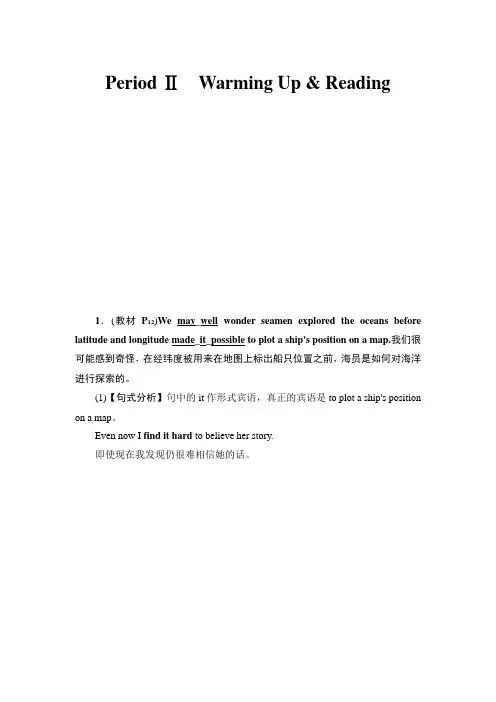
Period ⅡWarming Up & Reading1.(教材P12)We may_well wonder seamen explored the oceans before latitude and longitude made_it_possible to plot a ship's position on a map.我们很可能感到奇怪,在经纬度被用来在地图上标出船只位置之前,海员是如何对海洋进行探索的。
(1)【句式分析】句中的it作形式宾语,真正的宾语是to plot a ship's position on a map。
Even now I find it hard to believe her story.即使现在我发现仍很难相信她的话。
一般说来,当不定式、动名词、从句等用作宾语且其后跟有宾语补足语时,就应在宾语补足语前使用形式宾语,而将真正的宾语移至句末。
it 用作形式宾语的基本句型是:动词+形式宾语+宾语补足语+真正宾语。
I thought it strange that she hadn't written.她没有写信,我感到奇怪。
George made it clear what he wanted.乔治说得很明白他想要什么。
【导学号:15680009】翻译句子①我认为你最好住这儿。
________________________________________________________________②她来帮忙了,我们十分感激。
________________________________________________________________ 【答案】①I think it best that you should stay here.②We really appreciate it when she offered to help.(2)may well 很可能You might well find that you'll need more by the weekend.到周末你很可能会发现你需要更多东西。
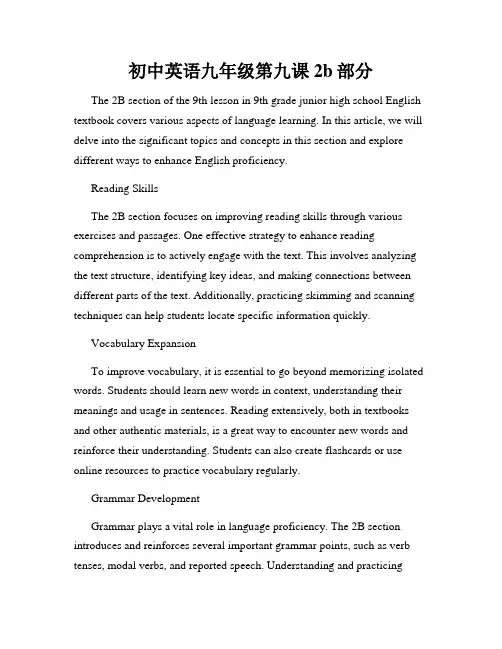
初中英语九年级第九课2b部分The 2B section of the 9th lesson in 9th grade junior high school English textbook covers various aspects of language learning. In this article, we will delve into the significant topics and concepts in this section and explore different ways to enhance English proficiency.Reading SkillsThe 2B section focuses on improving reading skills through various exercises and passages. One effective strategy to enhance reading comprehension is to actively engage with the text. This involves analyzing the text structure, identifying key ideas, and making connections between different parts of the text. Additionally, practicing skimming and scanning techniques can help students locate specific information quickly.Vocabulary ExpansionTo improve vocabulary, it is essential to go beyond memorizing isolated words. Students should learn new words in context, understanding their meanings and usage in sentences. Reading extensively, both in textbooks and other authentic materials, is a great way to encounter new words and reinforce their understanding. Students can also create flashcards or use online resources to practice vocabulary regularly.Grammar DevelopmentGrammar plays a vital role in language proficiency. The 2B section introduces and reinforces several important grammar points, such as verb tenses, modal verbs, and reported speech. Understanding and practicingthese grammar rules will enable students to express themselves accurately and clearly. Engaging in grammar exercises, like completing sentence transformations or writing dialogues, will help solidify their grasp of these concepts.Listening ComprehensionListening comprehension is key to effective communication. In the 2B section, students are exposed to various listening materials such as dialogues, monologues, and interviews. Active listening involves paying attention to both the main ideas and specific details. Students can improve their listening skills by engaging in regular listening practice, such as watching English movies or TV shows, listening to English podcasts, or participating in language exchange programs.Speaking and Writing PracticeThe 2B section also provides opportunities for students to practice their speaking and writing skills. To improve spoken English, students should engage in activities that promote oral communication, such as class discussions, role-plays, and presentations. These activities allow students to express their ideas confidently and fluently, while also improving pronunciation and sentence structure.When it comes to writing, it is crucial to develop both creativity and organization. Students should be encouraged to write regularly, using different genres such as narratives, descriptive essays, and argumentative essays. Feedback from teachers or peers can help identify areas of improvement and provide guidance for enhancing writing skills.Effective Study HabitsLastly, cultivating effective study habits is essential for mastering any subject, including English. Students should establish a consistent study routine, allocate dedicated time for English practice, and create a conducive learning environment. Utilizing various resources, such as textbooks, online platforms, and language learning apps, can further facilitate independent studying.In conclusion, the 2B section of the 9th grade junior high school English textbook covers a wide range of language learning skills. By incorporating the strategies mentioned above, students can enhance their reading, vocabulary, grammar, listening, speaking, and writing abilities. Developing effective study habits will contribute to a comprehensive English learning experience and foster long-term language proficiency.。
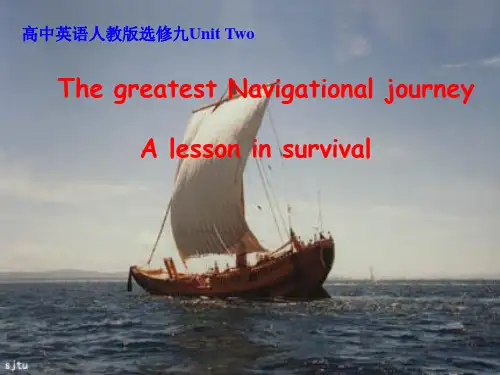

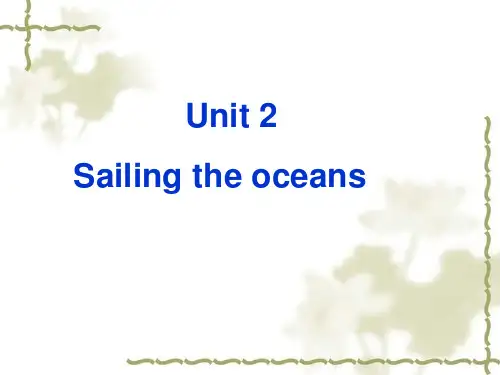
![[高中英语]新人教版英语高三选修9:Unit 2教案【第6课时】](https://uimg.taocdn.com/009cc9e3f242336c1fb95e41.webp)
新人教版英语高三选修9:Unit 2教案【第6课时】The Sixth Period GrammarThe Predicate and AgreementTeaching Aims:1.Revise one of the sentence elements ---the Predicate and do plenty of exercises to consolidatewhat we have revise.2.Study Agreement to improve th e students’ ability to use the English language.Teaching Important Points:1.How to choose the proper form of the Predicative in order to express what we want to say.2.Help the students to make a summary of the usage of agreement.Teaching Difficult Points:How to choose a proper predicate according to its subject.Teaching Methods:1.Discussion method to let the students have a clear understanding.2.Pair work or group work to make every student engaged in all the activities in class. Teaching Aids:1. a computer;2. coursewareTeaching proceduresStep1 GreetingsGreet the whole class as usual.Step2 RevisionCheck the homework exercises.Step3 Grammar: the PredicateA. Show the students some sentences and ask them to discuss and tell what member of the sentence each underlined part is.①What nationality is he?②That’s something we have always to keep in mind.③John is the second to learn about it.④Diamonds are precious.⑤The play we saw last Saturday is moving and we were all moved.⑥All we can do is to go and meet him.⑦He has been away for 3 years.⑧She is not what she used to be.B. Something about the predicate:谓语谓语用来说明主语的动作或状态,由动词或动词词组担任.有四个要点,举例归纳如下:1. 动词可分为及物动词、不及物动词和连系动词.1)需要跟有宾语的动词叫及物动词,及物动词后可跟一个宾语、直接宾语和间接宾语或一个宾语带宾语补足语.例如:直接宾语Children seek independence.The trial raised a number of questions.He has always liked Mr. Philips.He made the shortest speech I have ever heard.A couple were having a drink at a table by the windowHe took photographs of Vita in her summer house直接宾语和间接宾语They gave us a wonderfully warm welcome.Mr Schell wrote a letter the other day to the New York Times.(… wrote the New York Times a letter.)I took out the black box and handed it to her. (…handed her the box.)l had lent my apartment to a friend for the weekend.He left the note for he r on the table.一个宾语带宾语补足语Willis’s jokes made her uneasy.Last year they made him captain of the TeamThe people named the place “Turbo Kutu”.I thought it right to go there without delay.Have you found it difficult to speak?2)不需要跟有宾语的动词叫不及物动词.例如:Her whole body ached.Donald was lying on the bed.Bob coughed all night.All the leaves have fallen and winter is coming.I will travel south this summer and won’t come back to my office until the end of August.有几个不及物动词后可以跟有与之同形的名词,这叫同源宾语.例如:They are living a peaceful life. (=They are living peacefully.)He died a heroic death . (=He died heroically.)The girl laughed a merry laugh. (=The girl laughed merrily.)He sighed a deep sigh. (=He sighed deeply.)许多动词往往既是不及物动词又是及物动词.例如:Gus asked me whether I’d like to have dinner with him. I accepted.(vi.)I accepted the invitation. (vt.)He painted every day. (vi.)He paints vivid portraits of friends and acquaintances. (vt.)He ran as fast as he could. (vi.)She ran a hotel in the centre of the city. (vt.)Father never smoked or drank all his life. (vi.)He drank a good deal of coffee. (vt.)At last she thanked them and left. (vi.)A11 I know is that Michael and I never left the house. (vt.)3 ) 连系动词虽具有词汇意义,但需要带有表语才能构成动词谓语.例如:The station seems a very small one.They haven’t remained loyal to the government.Their hall was larger than his whole flat.The task of inspecting it proved to be exciting and interesting.It sounds unnatural to us.My memories of a London childhood are happy ones.His body was the color of bronze.2动词词组或称短语动词,可以扩展或改变动词的意义,它们的构成是:·动词+副词Mary went away for a few days.·动词+介词The other day I came across a letter from Brunei written in the last year of his life.·动词+副词+介词You may have come up against unexpected difficulties.3情态动词与动词连用构成的谓语.例如:I must leave very soon.The rich ought to pay tuition fees for their children.You may have heard of him.You should not have done so.Step 4 PracticeChoose the best answers.1. ---You haven't said a word about my new coat, Brenda. Do you like it?---I'm sorry I _____anything about it sooner. 1 certainly think it's pretty on you.A .wasn't saying B. don't say C. won't say D. didn't say2. --- Is John coming by train?---He should, but he _____ not. He likes driving his car.A. mustB. canC. needD. may3. I wonder why Jenny _____us recently. We should have heard from her by now.A. hasn't writtenB. doesn't writeC .won’t write D. hadn't written4. The evening news comes on at seven o'clock and _____only thirty minutes.A. keepsB. completesC. finishesD. lasts5. ---Has Sam finished his homework today?---I have no idea. He_____ it this morning.A. didB. has doneC. was doingD. had done6. The forest guards often find campfires that have not been _____ completelyA. turned downB. put outC. put awayD. had done7. The first use of atomic weapons was in 1945 and their power__ increased enormously ever since.A. isB. wasC. hasD. had been8. 1 don't _____ rock’ n’ roll. It's much too noisy for my taste.A. go afterB. go away withC. go intoD. go in for9. The teacher, with 6 girls and 8 boys of her class, _____visiting a museum when the earthquake struck.A .was B. were C. had been D. would be10. --- Who is the girl standing over there?---Well, if you _____ know, her name is Mary.A. mayB. canC. mustD. shall.11. On hearing the news of the accident in the coal mine, she _____ pale.A. gotB. changesC. wentD. appears12. Mary kept weighing herself to see how much_____ she was getting.A. heavierB. heavyC. the heavierD. the heaviest13. Happy birthday. Alice! So you have_____ twenty-one already.A. goneB. turnedC. grownD. passed14. The flowers______ sweet in the botanic garden, which attracted the visitors to the beauty of nature.A. to smellB. smelledC. smellingD. are smelled15. Having a trip abroad is certainly nice for old couples, but it remains _____ whether they will enjoy it.A. to be seenB. to seeC. seeingD. seen1-5 DDADC 6-10 BCDAC 11-15 CABBAStep 5 Grammar: AgreementShow the students something about agreement:主谓一致1.并列结构作主语谓语用复数2.主谓一致中的就近原则3.谓语动词与前面的主语一致4.谓语需用单数5.指代意义决定谓语的单复数6.与后接名词或代词保持一致Step 6 Practice1. More than one person _______ killed in the accident. ( be )2.More questions than one ______ been asked. ( have)3.Part of part of the meat _______spoilt. ( be )4.Most of the books _________ missing. ( be )5. The number of errors ______ surprising.6. Jane and Mary ______ alike.7. The crowd ______running for their lives.8. The iron works _____ hidden behind the trees.9. Either your students or Mr. Wang ______ this.10. His family ____ going to have a long journey.11. The whole family_____ watching TV.12. The population of China ____ very large, and eighty percent of the population in China _____ farmers.13. The police _____ searching for him.14. A sheep ____ over there.15. Some sheep _____ over there.16. The doctor’s _____ on the side of the street.17. My uncle’s _____ not far from here.18. Richardson’s _____ a lo t of imported goods to sell.Ask the students to finish the exercises.Suggested answers:1. was2. have3. was4. were5. was6. look7. were8. was9. knows 10. is 11. are 12. is , are 13. are 14. is 15 are 16. is 17. is 18. areStep 7 Summary and Homework1.Do what we learn today.2.Do the exercise about Using Structures on page 62.********全单元教学目标概论*********************。
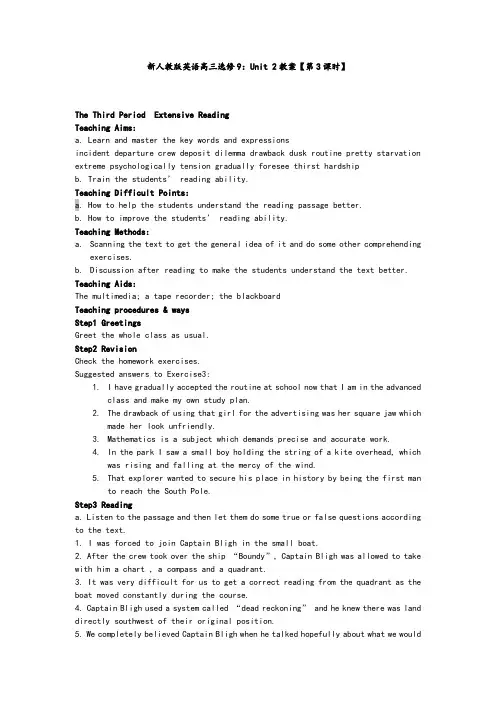
新人教版英语高三选修9:Unit 2教案【第3课时】The Third Period Extensive ReadingTeaching Aims:a. Learn and master the key words and expressionsincident departure crew deposit dilemma drawback dusk routine pretty starvation extreme psychologically tension gradually foresee thirst hardshipb. Train the students’ reading ability.Teaching Difficult Points:a. How to help the students understand the reading passage better.b. How to improve the students’ reading ability.Teaching Methods:a.Scanning the text to get the general idea of it and do some other comprehendingexercises.b.Discussion after reading to make the students understand the text better. Teaching Aids:The multimedia; a tape recorder; the blackboardTeaching procedures & waysStep1 GreetingsGreet the whole class as usual.Step2 RevisionCheck the homework exercises.Suggested answers to Exercise3:1.I have gradually accepted the routine at school now that I am in the advancedclass and make my own study plan.2.The drawback of using that girl for the advertising was her square jaw whichmade her look unfriendly.3.Mathematics is a subject which demands precise and accurate work.4.In the park I saw a small boy holding the string of a kite overhead, whichwas rising and falling at the mercy of the wind.5.That explorer wanted to secure his place in history by being the first manto reach the South Pole.Step3 Readinga. Listen to the passage and then let them do some true or false questions according to the text.1. I was forced to join Captain Bligh in the small boat.2. After the crew took over the ship “Boundy”, Captain Bligh was allowed to take with him a chart , a compass and a quadrant.3. It was very difficult for us to get a correct reading from the quadrant as the boat moved constantly during the course.4. Captain Bligh used a system called “dead reckoning” and he knew there was land directly southwest of their original position.5. We completely believed Captain Bligh when he talked hopefully about what we woulddo when we got back to England.6. Captain Bligh was as weak as the rest of us but he was determined not to give up.7. Captain Bligh kept us busy and tried to take our minds off our stomach and thirst all the way.8. We finally escaped the jaws of death and arrived in Timor over fifty days after being set loose in our small boat.Answers: (FFTFFTTF)b. Give the students a few minutes to read the passage again and then get the general idea of the text.This is the storey of Captain Bligh’s amazing journey across the Pacific Ocean in an open boat with his followers after another group of sailors under Fletcher Christian had taken over the ship. Later Captain Bligh and his men made for the island of Timor using a combination of navigational skill and “dead reckoning”, which is guessing the correct direction. The voyage lasted over 40 days and was one of the greatest examples of survival at sea.c. Explain some difficult sentences, phrases and words.Key phrases:1.in addition 另外There was an earthquake and, in addition, there were tsunamis.除了地震之外,还有海啸。
